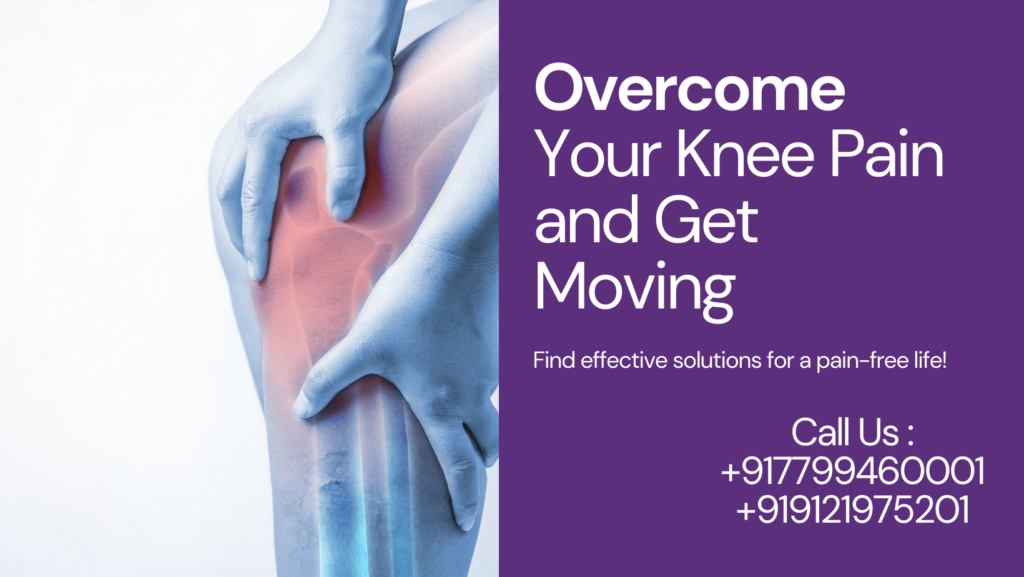Knee pain is a common issue that affects people of all ages and can make even the simplest tasks feel challenging. Whether it’s caused by injury, overuse, or aging, knee pain can significantly impact your quality of life. There are ways to manage and alleviate knee discomfort so you can get back to doing what you love.

Understanding Knee Pain: What’s Really Going On?
Before we dive into solutions, it’s important to understand why knee pain occurs. Knee pain can result from various conditions, including:
- Osteoarthritis: A degenerative condition where the cartilage in the knee wears down over time.
- Injuries: Sprains, ligament tears (such as ACL injuries), and meniscus damage can cause sudden or chronic pain.
- Overuse: Repetitive activities or excessive stress on the knee joint can lead to tendinitis or bursitis.
- Age-Related Changes: As we age, the cartilage in our joints deteriorates, leading to more frequent pain and stiffness.
Identifying the source of your knee pain is crucial for determining the best treatment options.
Signs It’s Time to Seek Medical Attention
While minor knee discomfort can often be managed at home, certain symptoms may indicate a more serious issue. You should seek medical help if:
- Pain persists or worsens over time, even with rest
- You notice swelling, redness, or warmth around the knee
- Difficulty moving the knee, or a feeling that the knee might give way
- Pain occurs after an injury or trauma
Don’t ignore persistent knee pain—getting an accurate diagnosis early on can prevent further damage and help you recover faster.
Effective Solutions for Knee Pain Relief
If knee pain is holding you back, there are several approaches to finding relief. Depending on the severity of your condition, these options may be a part of your recovery plan:
1. Rest and Ice: The First Step in Relief
For acute knee pain, rest is key. Give your knee time to heal by avoiding activities that strain the joint. Applying ice for 20-minute intervals can reduce inflammation and swelling, providing immediate relief.
2. Physical Therapy: Strengthening for Long-Term Relief
Working with a physical therapist is one of the most effective ways to address knee pain. A personalized exercise plan can help strengthen the muscles around your knee, improve your range of motion, and provide stability to the joint. This can reduce pain and prevent future injuries.
3. Medications: Managing Pain and Inflammation
Over-the-counter medications like NSAIDs (ibuprofen) can help reduce pain and swelling. These can provide temporary relief and help you continue with your daily activities. Always consult a healthcare professional if you need to take them long-term.
4. Maintain a Healthy Weight
Excess weight places extra pressure on the knee joint, exacerbating pain, especially in individuals with osteoarthritis. Maintaining a healthy weight can alleviate this added stress and reduce inflammation, promoting long-term knee health.
5. Choose the Right Footwear
Wearing supportive shoes can make a huge difference in knee pain management. Opt for shoes that provide cushioning and arch support, as they can help distribute pressure more evenly and reduce stress on your knees.
6. Use Assistive Devices for Extra Support
Knee braces or sleeves can provide additional support and stability, particularly during physical activity. These devices can help protect the knee from further strain and reduce discomfort while moving.
7. Surgery: A Last Resort
In cases where conservative treatments don’t provide relief, surgery may be necessary. Options like knee arthroscopy, ligament repair, or even knee replacement surgery can offer a more permanent solution, but they are typically only considered when other treatments have failed.
Don’t Let Knee Pain Hold You Back Any Longer
Knee pain can be frustrating, but it doesn’t have to control your life. By understanding the cause of your pain and exploring various treatment options, you can find effective solutions that work for you. Whether it’s through rest, physical therapy, or medical interventions, taking action is the first step toward relief.
If knee pain is preventing you from living life to the fullest, consult with a healthcare provider today. They can help you find the right treatment plan, so you can get back on your feet and live without limitations.
Take control of your knee pain—don’t let it hold you back!
